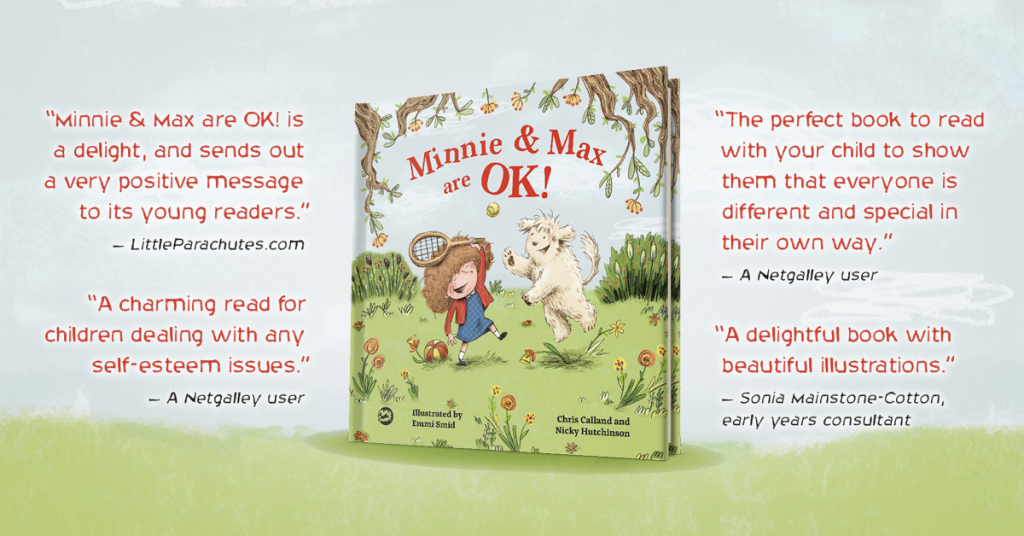 Chris Calland and Nicky Hutchinson, authors of Minnie and Max are OK!, talk about body confidence, how it can influence children’s self-esteem and what adults can do to help children have a more positive body image.
Chris Calland and Nicky Hutchinson, authors of Minnie and Max are OK!, talk about body confidence, how it can influence children’s self-esteem and what adults can do to help children have a more positive body image.
What does a positive body image mean to you?
If a person has a positive body image they are happy with the way they look and they accept and feel good about their body. Helping children to be positive about their bodies encourages them to be happy, healthy and confident. Having a positive body image makes children less likely to experience symptoms of depression and anxiety. It is a crucial part of mental health.
Do you feel that the number of children with body image issues has risen of late? What reasons do you feel are behind this?
Yes, unfortunately the number of children experiencing body image anxieties is growing rapidly and body dissatisfaction is being seen more in many really young children, even at pre-school stage. It is an issue which affects both boys and girls.
Messages from the media and comments and feedback that come from family and friends can all affect a child’s body image. We now live in an image obsessed society where what you look like is often emphasised as the most important part of you. Children are often exposed to messages that suggest that changing your appearance can solve life’s problems and being good looking leads to happiness. The selfie culture, social media, and advertising all place an emphasis on looks.
Parents who are young children’s most important role models are also influencing their children by talking about their own body image worries and concerns.
Although there is a real concern about child obesity, helping a child who is overweight to have a positive body image does not mean encouraging them to be unhealthy
What inspired you to write Minnie and Max are OK!?
Many parents were asking us for help. They didn’t know how to start a conversation about body image with their child. We have heard so many times from horrified parents that their child has arrived home from nursery saying they were ’fat’ or making negative comments about another child’s appearance. Others have said that their children were really oblivious to any body image pressures and asked us how to ensure that they stay that way.
Looking at the roles of the different characters and the journeys they go through, how does this storybook help children to transform their self-esteem and way of thinking?
The story is about a little girl called Minnie and her dog, Max. Minnie was teased at school and is feeling insecure about her looks and is comparing herself unfavourably to others. At the same time her scruffy dog Max admires other dogs and wishes he had their looks. They journey to the park with Grandma and through their adventures Minnie begins to appreciate her own unique qualities and skills. She also begins to realise that her looks are influenced by her genetic inheritance as Grandma points out family likenesses. Max too begins to feel appreciated for who he is as they have fun with their friends and they continue their journey home feeling much more content about themselves and who they are.
What advice would you give to teachers and parents whose children are displaying body confidence issues?
Parents are the biggest influence on their child and there are some simple ways to help them develop positive self-esteem and a healthy body image:
- Be aware of how you talk about your own and others looks
- Limit screen time and encourage as much outdoor play as possible
- Recognise your child’s qualities and skills rather than just focusing on their appearance
- Notice and celebrate people’s differences
- Highlight the importance of what your child’s body can do rather than what it looks like
- Encourage them to question the ‘perfect’ images they see
- Take an interest in your child’s individual opinions and views.
If you would like to find out more about our Education books and receive the latest news and offers on them, why not join our mailing list? We can send information by email or post as you prefer. You can unsubscribe at any time. You may also be interested in liking our Special Educational, PSHE and Early Years Resources Facebook page.